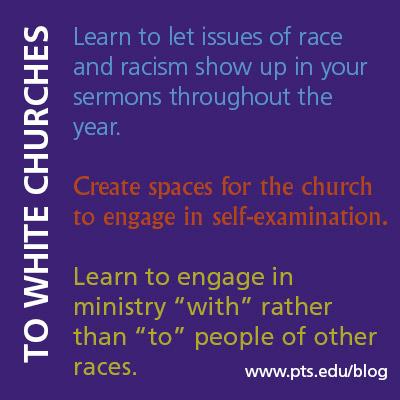I was just doing what I thought I was supposed to do as a white pastor of an almost entirely white congregation: invite an African-American preacher to preach on Martin Luther King Jr. weekend. An assistant professor of black church studies at a nearby seminary had been worshiping with us lately, so I called her with the invitation.
“Thanks, Roger, for this invitation,” she said. “But I really don’t like to do white people’s politics for them.”
I stammered, apologized, stammered some more, and drew the conversation to an awkward end. Then I let what she said sink in. She was asking me in so many words: Can only black people talk about race? Why can’t you say to your congregation what needs to be said?
I’ve thought many times about that conversation in the years that followed, and not a few times during this Black History Month. At the end of January and in February we invite an African-American to preach, sing the few African-American spirituals in the hymnal, mention Martin Luther King Jr. and Rosa Parks, and then head into March with clear consciences.
But do these gestures keep us from doing the work of self-examination, awareness-raising, and deep understanding we need to do as white Christians?
As we come to the end of Black History Month, here are a few suggestions for white pastors and churches that might help us “do the politics” we need to do:
Learn to let issues of race and racism show up in your sermons throughout the year—not just in February or in response to a crisis. I had to learn as a pastor to let the language of race and racism become a natural part of my preaching. Could I preach about the sin of racism as easily as I could the sins of greed or gluttony? Could stories of civil rights champions past and present find their way into my sermons 12 months a year? Did I only mention race when race appeared on the screen of the nation’s consciousness? I’m thankful for a preacher’s honesty in pointing me to my job as the church’s pastor.
Create spaces for the church to engage in self-examination. I remember how surprised I was when I learned that our church had an African-American associate pastor in the early 90s. And how dismayed I was to learn he only stayed a year and few people remembered his name or the circumstances of his leaving. Together the staff and leaders of the congregation realized that we needed to create spaces to name our own church’s history around race as honestly as possible, spaces where we could remember and confess our own complicity in our city’s history of prejudice, discrimination, and violence. Discovering and confessing our own history was the first step toward authentic action.
Learn to engage in ministry “with” rather than “to” people of other races. When we began to engage in self-examination, we discovered that many of our ministries were ministries “to” people of other races. The neighborhoods around our church building were predominantly African-American, but we didn’t know how to be with them as neighbors. So we began a clear emphasis on getting to know our neighbors—living, learning, and listening with them. We stopped thinking that we had the expertise and the resources to fix “their” problems, and learned that the pain and hope belong to all of us in different ways. We watched as friendships formed across lines of race, and celebrated the ministries that grew out of these relationships.
One African-American preacher’s encouragement (and rebuke) to me prompts me to offer this encouragement to white congregations: Now that February is almost over, and no one else is telling us that racism, prejudice, and white privilege need to be topics of conversation—now let’s put these things on the table of our life together, and keep them there.
The Rev. Dr. L. Roger Owens is associate professor of leadership and ministry at Pittsburgh Theological Seminary and teaches courses in the MDiv, Doctor of Ministry, and Continuing Education programs. Before coming to PTS he served urban and rural churches for eight years as co-pastor with his wife Ginger.


Thank you for this post. When I was a Seminarian at Pittsburgh – i had a class held in a local black church in the City. The minister there told us students – that in his option, – black preachers should only reach at black churches and white preachers should only preach at white churches. I disagreed with him. But I am glad you posted this article and will read it over again. Two years ago I preached on the movie The Help – and it was n the anniversary of the March on Washington. I was a Washingtonian by birth and spoke of growing up in the 1960’s during segregation and integration. I had many photos of MLK and preached a great sermon that day – however my most devoted Head Usher got up in the middle of my sermon and walked straight out of the Church that day.
Difficult – to say the least.
I preached at his funeral last year and thought of him and his reaction to MLK while I was attending to his family at the service.
God Speed – Kate Huddelson
Thanks for this reflection and suggestions, Roger. I hope white churches take them to heart.
For churches that are struggling with issues of race, let me plug my organization, Roots of Justice along with our Lenten blog, Shout Like a Trumpet! (where you’ll find worship resources to help break the silence in white churches about race.)
Truly inspiring preaching and sermon here. I only read and listen to few ones and the Black Pastor Keion Henderson is on top of my list. He is truly a light for this new generation!